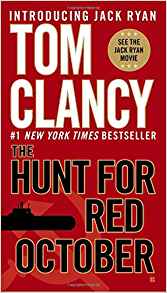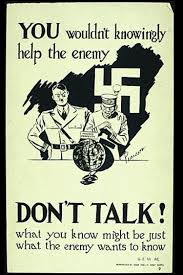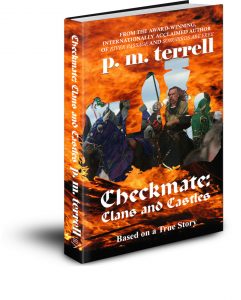When Fact Is Stranger Than Fiction
 For authors of suspense, the political landscape has posed some interesting challenges. It has always been a popular theme to select an enemy government that our hero must infiltrate and take down, even if it’s done in bits and pieces. Consider Ian Fleming’s James Bond, who during the Cold War came up against the USSR and the KGB time and again. Or Tom Clancy’s Jack Ryan whose espionage themes set during and after the Cold War involved enemies such as the USSR and later Russia and China. The USSR/Russia comprised targets that Americans seemed to agree on; to speak out on behalf of communism was tantamount to treason.
For authors of suspense, the political landscape has posed some interesting challenges. It has always been a popular theme to select an enemy government that our hero must infiltrate and take down, even if it’s done in bits and pieces. Consider Ian Fleming’s James Bond, who during the Cold War came up against the USSR and the KGB time and again. Or Tom Clancy’s Jack Ryan whose espionage themes set during and after the Cold War involved enemies such as the USSR and later Russia and China. The USSR/Russia comprised targets that Americans seemed to agree on; to speak out on behalf of communism was tantamount to treason.
So what does an author do when the lines are blurred?
Often books have been written after world-altering events and not during their height; The Grapes of Wrath by John Steinbeck was published in 1939 and though it was set during the Great Depression many Americans were still trying to recover from it—and many never did. When Gone with the Wind was released in 1936, the American Civil War had been over for more than seven decades and only the youngest from that era were still alive. All Quiet on the Western Front was written by a German veteran of World War I, Erich Maria Remarque, published in 1929—11 years after the end of the war, and A Farewell to Arms by Ernest Hemingway was also released the same year.
 During the height of conflict, the enemy was encountered on posters, in news stories and even in comic books, such as Captain America during World War II. We had common enemies during times fraught with war and conflict, from the British in the Revolutionary War to the Yankees or Rebels in the Civil War (depending on which side of the Mason-Dixon you happened to be on) to the Central Powers of World War I and the Japanese, Germans and Italians of World War II. During the height of the Cold War, scores of books were released that also painted the common enemy against whom Americans and its allies were always victorious.
During the height of conflict, the enemy was encountered on posters, in news stories and even in comic books, such as Captain America during World War II. We had common enemies during times fraught with war and conflict, from the British in the Revolutionary War to the Yankees or Rebels in the Civil War (depending on which side of the Mason-Dixon you happened to be on) to the Central Powers of World War I and the Japanese, Germans and Italians of World War II. During the height of the Cold War, scores of books were released that also painted the common enemy against whom Americans and its allies were always victorious.
Today’s political environment poses challenges for the author of fiction very similar to those faced during a civil war. Unlike a common enemy on the other side of a clear dividing line, we may face neighbors, family members or even friends with decidedly different political views. Russia is an enemy to some and trusted ally to others. Conflicts in the Middle East have no clear enemy that Americans have united behind; even those that attacked on 9/11 came from a country that today some prominent Americans embrace. The fingers are pointed in all directions and to choose one path guarantees the author of fiction the loss of 50% of their audience.
 The characters in my Black Swamp Mysteries series have hit an interesting dilemma; the latest in the series, Cloak and Mirrors, written before the Russian scandal that plagues our country today, centers around Russia’s new stealth technology. The main characters—Vicki Boyd and Dylan Maguire—are CIA operatives. At one time an employee of the American Intelligence Community was respected; today half the American population trusts the Russians more than our own Intelligence agencies. At the end of Cloak and Mirrors (spoiler alert) Vicki and Dylan must go dark—deep undercover to escape capture by the Russians. Should the next book pick up with the next chapter in their fight against Russia? Or do I play it safe as an author and depict them in a picturesque little village where they get caught up in a local murder investigation? Or perhaps I should simply wait things out and write the next installment after America decides which way she intends to go?
The characters in my Black Swamp Mysteries series have hit an interesting dilemma; the latest in the series, Cloak and Mirrors, written before the Russian scandal that plagues our country today, centers around Russia’s new stealth technology. The main characters—Vicki Boyd and Dylan Maguire—are CIA operatives. At one time an employee of the American Intelligence Community was respected; today half the American population trusts the Russians more than our own Intelligence agencies. At the end of Cloak and Mirrors (spoiler alert) Vicki and Dylan must go dark—deep undercover to escape capture by the Russians. Should the next book pick up with the next chapter in their fight against Russia? Or do I play it safe as an author and depict them in a picturesque little village where they get caught up in a local murder investigation? Or perhaps I should simply wait things out and write the next installment after America decides which way she intends to go?
 While trying to decide my characters’ fates, I delved into the past—all the way back to 1608, when my ancestor William Neely left Scotland for Ireland (Checkmate: Clans and Castles). There is something comforting about slipping into the past, knowing that things turned out; the world is still spinning and humans somehow survived. It gives us an illusion of progress when we realize that Americans are not ruled by an autocratic monarch that can upend our worlds in a whim. When we read of the formidable odds we faced in times past—the seemingly unstoppable British Empire, Nazi Germany, Japan—we know when all the chips were down, we came out swinging and victorious.
While trying to decide my characters’ fates, I delved into the past—all the way back to 1608, when my ancestor William Neely left Scotland for Ireland (Checkmate: Clans and Castles). There is something comforting about slipping into the past, knowing that things turned out; the world is still spinning and humans somehow survived. It gives us an illusion of progress when we realize that Americans are not ruled by an autocratic monarch that can upend our worlds in a whim. When we read of the formidable odds we faced in times past—the seemingly unstoppable British Empire, Nazi Germany, Japan—we know when all the chips were down, we came out swinging and victorious.
Books of fiction are often a means of escape to our readers. They take us around the world to exotic locations we might otherwise never visit. They place us in someone else’s shoes that we will never actually meet. They give us superpowers; the will to continue, the determination to succeed. They take us out of our present-day news cycle, away from the sadness and hostility of our current politics, away from economic woes and crushing responsibilities. Books are often savored because of their unique ability to transcend time and space and circumstance.
Are you reading now? What are you reading? Chances are your book depicts the world as having some semblance of normalcy despite any odds the hero may face. And it’s precisely that normalcy that we all need right now.
p.m.terrell is the internationally acclaimed author of more than 21 books, include the award-winning River Passage, award-winning series Black Swamp Mysteries and award-winning Ryan O’Clery Mystery Series. She is the Founder of Book ‘Em North Carolina Writers Conference and Book Fair and the Founder of The Novel Business. For more information, visit www.pmterrell.com.
